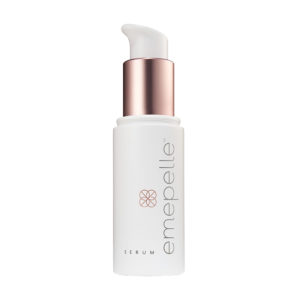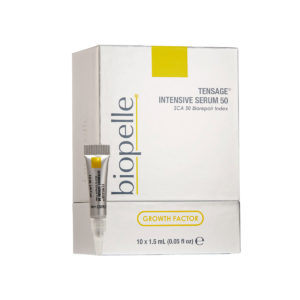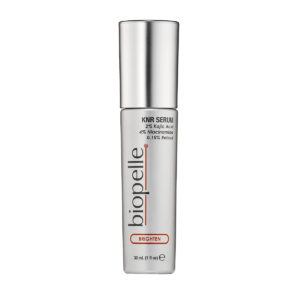As a seasoned skincare aficionado, you pay attention to the industry’s latest it-ingredients, but it can be difficult to prioritize what you want in your routine. The great thing about skincare ingredients is they each have a role to play. If you’ve come across the ingredient peptides, you may be curious about what they are, how peptides can benefit your skin and how they interact with other common ingredients. Like most skincare ingredients, the science behind peptides can help answer these questions and explain how combining peptides with other ingredients can produce the ideal skincare formula for you.
What Are Peptides?
Peptides are short strings of amino acids that help produce proteins. They’re found in every human cell and tissue, including the skin, and are part of a wide array of functions throughout the body. One of these functions is to stimulate collagen, a key element of firmer, younger-looking skin.
While our bodies naturally create proteins like collagen—which makes up 75-80% of your skin—elastin, keratin and peptides, changes in our system such as vitamin deficiencies, illness or just the aging process can slow down production. One of the most noticeable signs of how these proteins proliferate less frequently is the loss of volume in our faces. As natural peptides produce fewer proteins like collagen, our skin may look more dry, lax, and dull and we may see more fine lines and wrinkles.
Benefits of Peptides
One of the struggles with skincare is the fact that the skin was built to be a barrier. This means large molecules like topically applied collagen can’t be absorbed. However, peptides are much smaller than proteins which means they can easily be absorbed into the deeper layers of the skin. But what are the benefits of peptides when they make their way past the skin’s mantle, or top layer?
- Build a stronger skin barrier to fight off exposure to environmental pollutants and toxins
- Promote the production of elastin fibers which, when combined with collagen, can make skin firmer
- Minimize the appearance of fine lines and wrinkles
- Help even skin tone and reduce inflammation
How Do Peptides Work?
As we mentioned, some skincare products sit on top of the skin, but topical peptides are small enough to be absorbed. Once peptides have penetrated your skin, they help send signals to other cells to produce collagen. Studies show this method can reduce fine lines, wrinkles, photo-damage pigmentation, increase elasticity, firm and smooth skin. When searching for the right skincare products for your needs look for dermatologist-recommended products which have undergone clinical studies.
How Can I Incorporate Peptides Into My Skincare?
You’ll find no shortage of products like serums, creams, lotions and face masks that claim to have peptides, but not all products are created equal or tell you peptides are a part of their formulation. When looking for peptide products:
- Read the label: Watch for words that start with “palmitoyl” or end in “peptides.” You may also find them by how many amino acids make up the peptide. For example: dipeptide (2), tripeptide (3) and tetrapeptide (4). Some may be listed by their chemical activity such as copper peptides and neuropeptides.
- Select the right form of product: While peptides are beneficial, not all applications are ideal for this ingredient. Go with a product that has lasting contact with your skin like a serum, lotion or cream.
- Pay attention to other ingredients: Peptides can work well with other ingredients, while others make peptides less effective.
Pairing peptides with other ingredients
Like any other recipe, certain ingredients are best paired together; combining peptides with other skincare ingredients is no different. To ensure your skincare product performs best know which ingredients aid peptides like antioxidants, hyaluronic acids and niacinamide. It’s best to avoid mixing products that contain peptides and alpha hydroxy acids (AHAs) because the acid could lessen the efficacy of the peptides.
Biopelle’s Peptide Products

Biopelle’s dermatologist-recommended skincare is recognized its results and features peptides in many formulations. Adding peptides to your skincare routine can help your skin look its best.
- Emepelle Serum – This combination of peptides, antioxidants, niacinamide, hyaluronic acid and breakthrough MEP Technology addresses dull, dry, Estrogen Deficient Skin often experienced by menopausal and perimenopausal women. Ideal for daily use and is suitable for layering.
- Emepelle Night Cream – Formulated for mature skin with MEP Technology, peptides, retinol, emollients and humectants help restore hydration, firmness and radiance.
- KNR Serum – Vitamin C, niacinamide, peptides, kojic acid and retinol combine to reduce the appearance of wrinkles and pigmentation. Ideal for nighttime use. If used in the morning follow with sunscreen SPF 30 or higher.
- Tensage Intensive Serum 50 – This concentrated formula combines SCA Biorepair Technology with peptides and other anti-aging and brightening agents to help repair and improve the appearance of fine lines, wrinkles and texture of aging skin.
- Tensage Radiance Eye Cream – This lightly tinted eye cream pairs SCA Biorepair Technology natural growth factors with peptides to help even skin tone and reduces dark circles and fine lines around the eye area. Apply once or twice daily.
Learn more about Biopelle’s entire range of high-quality ingredients and how they can help with a variety of skin concerns.



